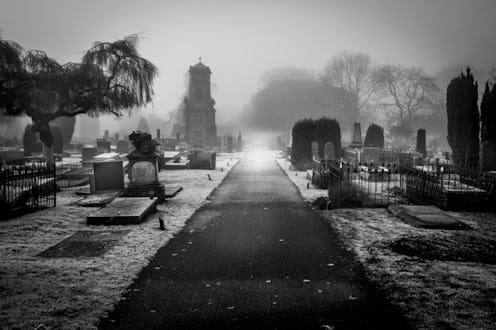
Even if you find it creepy to talk about death in general, and what a dead body can do in particular, the weirdness of it all can be lessened ever so slightly by looking at it from a scientific standpoint, including what types of activities continue on once the heart stops ticking. Because believe it or not, the body can do plenty of things even after it's technically dead.
"When a person dies, there are many stages it goes through before the the body completely ceases to function," spiritual counselor Davida Rappaport tells Bustle. "Once the heart stops beating, blood no longer circulates throughout the body supplying nutrients to keep the organs alive. The body will start to shut down slowly."
But even after a person is declared dead, movements, sounds, growth, and change can still occur. Dead bodies have been known to make noise, to move, to digest food, and some studies have even shown that our genes remain active. This has a lot to do with the rapid changes that occur, that can affect the muscles, skin, and other organs.
As Rappaport says, "The process of rigor mortis reaches its peak at about 13 hours. Once the body has completely stiffened, the muscle contractions start to soften again and the bacteria in and on the body starts the process of decomposition — approximately 48-60 hours later." That's definitely creepy. And yet it's all part of a very normal process. Read on for more changes the body will go through, according to science.
1It Can Moan And Groan
Perhaps one of the creepiest things a dead body can do is make noises that sound like moans and groans, especially if the person received emergency medical care prior to their death.
While this may sound straight out a zombie movie, there's a perfectly reasonable explanation. "When a doctor or someone tries to resuscitate a person, extra air gets pumped into the patient’s lungs and stomach," Caleb Backe, a health and wellness expert at Maple Holistics, tells Bustle. "After you’ve died, the air can still escape if someone applies pressure to the body while moving it. It could sound like moans, groans, and even squeaks."
But it can still happen even if doctors didn't attempt to resuscitate them. "This is extremely common," Backe says. "Even if the patient didn't have air pumped in, they may still have oxygen trapped in their lungs, that won’t be released until they are moved." At that point the air will be expelled, causing what sounds like "moan."
2Nails Get Longer
There's a rumor that hair and nails continue to grow after death. And while that's true, to an extent, it's not the same type of growth that happens when you're alive.
Instead of growth happening due to the formation of new cells, it's more of an illusion caused by dehydration. "Skin starts to recede as moisture begins to leave the body, so over time, it appears that hair and nails continue growing after death," Rappaport says.
3Bodily Functions Continue
However horrible it may sound, it's not uncommon for a body to pee or poop after death. But it's not a conscious choice, whatsoever.
"At the time of death, the human body releases waste products," Rappaport says, due in part to the sudden lack of muscle tension.
"The bladder will empty, which is why some people may notice that a dead body will have wet themselves," Rappaport says. "The colon will eventually dump its contents shortly thereafter, which could take a few hours to empty."
4Genes May Remain Active
Even though someone has died, it doesn't necessarily mean their body's work is done. "Many genes actually become active in our bodies after our death," Ira S. Pastor, CEO of life sciences company Bioquark Inc., tells Bustle.
In fact, studies have shown that genes may remain turned on days after an animal dies, and researchers are looking into how this may help preserve donated organs for plantation.
"Interestingly, many of these genes have been identified as embryonic/fetal development genes, almost as if the genome is 'shouting out' to try to tell the body to 'go back in time' and start life over again," Pastor says. Interesting, right?
5Digestion Continues
While a body might not be actively digesting food for the benefit of nutrition, it can still break it down and "digest" whatever the person ate before they died.
"There are still friendly and parasitic bacteria in a body’s digestive tract," Rappaport says. "The friendly bacteria that helps us digest our food are still alive and feeding as well at the parasitic bacteria that feed on cadavers breaking down amino acids."
This is, in part, what contributes to the foul smell of a dead body. As Rapapport says, "The breakdown of these amino acids emit the foul smelling compounds, appropriately named putrescine and cadaverine."
6Muscles Can Move
It's not uncommon for a body to move for up to 12 hours after death, all thanks to the way muscles contract as the system shuts down.
"Even after the brain stops functioning, it takes a while for the nervous system to also stop functioning," Rappaport says. "So people may see muscle twitches or movements."
This why many nurses and doctors report cadavers "moving" in the morgue.
7Erections Can Occur
Depending on the position a person is in when they die, it's possible for the body to get an erection after death. This is due to the pooling of blood, which is no longer being circulated through the body, Rappaport says.
But rigor mortis can also play a role. "Once rigor mortis sets it and the body muscles begin to stiffen, occasionally, [the penis] may stiffen and become erect," Rappaport says. "It may also ejaculate as well."
It's weird and creepy and kind of horrifying to think about what the body can do after death, but keep in mind it's all a natural part of the process.